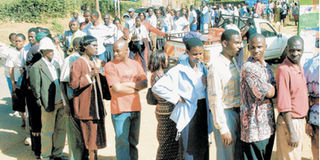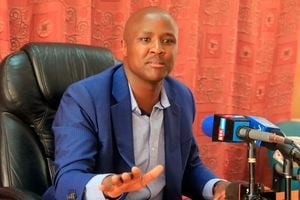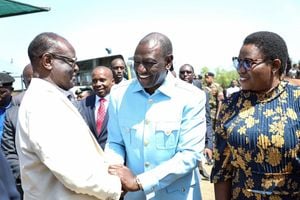The budget question in the next election date

Voters at a past election. The budget process could be a key determinant of the next General Election, especially on an August or December date. Photo/FILE
It may not have featured prominently among the obstacles likely to delay the date of the next General Election, but the budget process is slowing making its way to the center stage.
Now financial experts say it could be a key determinant, especially on an August or December date.
“December elections will be ideal. There will be time to prepare. Any date before this will disrupt the budget,” the chairman of the Commission on Revenue Allocation, Mr Micah Cheserem, said last week during the launch of the submission of budget proposals by the public.
The 2012 budget making process is expected to be the most participatory, with the public and Parliament forwarding their proposals.
Become irrelevant
It will also herald a new beginning where the budget reading ceremony will become irrelevant.
In this, the country is running a tight timeline, with the Public Financial Management Bill expected to be tabled in Parliament by February 28 and budget proposals passed by Parliament by the end of April.
The formula on how the devolved funds will be shared out will have to be passed by Parliament.
“The 2011 budget had allocations for the preparatory work of the elections and the coming budget would have to sufficiently provide for the elections. The challenge is whether we can be able to pull through (if elections are held in August).
“The procurement process would present difficulties and the possibility of waivers would have to be explored,” said Mr John Mutua, a programme officer, Budget Information Programme, at the Institute of Economic Affairs.
Finance minister Uhuru Kenyatta said the 2012 Budget would mark the end of phase one on implementation of Vision 2030, facilitate implementation of the new Constitution and usher in devolved units.
He said although the government had undertaken several reforms to strengthen public financial management — like improvement in cash management systems, procurement, tax administration and internal and external audit systems, introduction of programme-based budgeting and integrated financial management information systems — the legal framework to anchor them with the new Constitution was yet to be done.
Legal framework
“These reforms will have to be anchored in the legal framework in line with the Constitution. We have, in this regard, finalised the preparation of the comprehensive Public Financial Management Bill,” he said.
Still, the issue of the huge resources required for the takeoff of devolved units is a challenge that the country will grapple with after the economy suffered shocks from a weakening shilling, drought and high inflation due to high cost of fuel and food prices.
“On the expenditure side, we have experienced demand for additional spending pressures to accelerate implementation of the Constitution, deal with security operations, salary demands by teachers, doctors and other public servants and servicing of external debts,” the minister said.
Military operations
According to the accounts, Kenya is spending about Sh210 million every month on military operations in Somalia to ward-off terrorists.
Nevertheless, Mr Kenyatta said the government had cut back on non-essential services so as to bring down the budget deficit from 6.1 per cent of Gross Domestic Product to 5.1 per cent by 2014-2015.
The austerity measures would also reduce inflation from 19.7 per cent in November 2011 to 5 per cent in the same period.
The budget comes against the backdrop of great expectations from the public for expanded funding of economic activities after the take off of counties.
“We are in a very difficult budget constraint situation and the proposals have to be realistic, and should take into consideration this fact,” the chairman of the Parliamentary Committee on Budget, Mr Elias Mbau, said.
Treasury permanent secretary Joseph Kinyua sounded a similar warning, even as expectations of better livelihoods under the county government soar.
“We recognise that the next budget is being prepared against the background of severe economic challenges, both at domestic and global levels. Sectors, therefore, have been reminded to prioritise carefully to ensure that key national goals are identified and funded,” Mr Kinyua said.
He said the budget proposals that were being reviewed had been prepared with the input of the 47 counties, based on the sectors.




